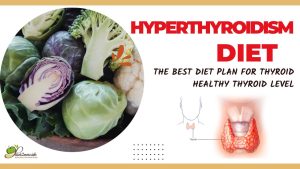Hyperthyroidism is a condition that occurs when the thyroid gland produces too much thyroid hormone. A healthy diet can play a vital role in managing hyperthyroidism and reducing its symptoms. Here is a diet chart for hyperthyroidism that can be helpful:
- Iodine-rich foods: Iodine is a crucial mineral for the proper functioning of the thyroid gland. However, too much iodine can worsen hyperthyroidism symptoms, so it is important to consume iodine in moderation. Foods that are high in iodine include seaweed, fish, dairy products, and iodized salt.
- Low-iodine diet: In some cases, a low-iodine diet may be recommended for people with hyperthyroidism. A low-iodine diet involves avoiding foods that are high in iodine, such as seaweed, fish, and dairy products, as well as foods that contain iodized salt. A healthcare provider or registered dietitian can provide guidance on a low-iodine diet.
- Goitrogenic foods: Goitrogens are compounds that can interfere with thyroid hormone production. Foods that are high in goitrogens include cruciferous vegetables such as broccoli, cabbage, and cauliflower, as well as soy products, peanuts, and strawberries. While these foods can be healthy in moderation, people with hyperthyroidism may need to limit their consumption of goitrogenic foods.
- Antioxidant-rich foods: Hyperthyroidism can cause oxidative stress in the body, which can lead to inflammation and damage to cells. Eating a diet that is rich in antioxidants can help to reduce oxidative stress and inflammation. Foods that are high in antioxidants include berries, dark chocolate, leafy greens, nuts, and seeds.
- Protein-rich foods: Hyperthyroidism can cause muscle weakness and fatigue, so it is important to consume adequate protein to maintain muscle mass and strength. Protein-rich foods include lean meats, fish, eggs, beans, and tofu.
- Calcium-rich foods: Hyperthyroidism can increase the risk of osteoporosis, a condition that causes the bones to become weak and brittle. Consuming adequate calcium can help to maintain bone health. Foods that are high in calcium include dairy products, leafy greens, and fortified plant milks.
It is important to work with a healthcare provider and a registered dietitian to develop a personalized diet plan for hyperthyroidism. The diet should be tailored to individual needs and preferences, as well as any underlying health conditions or medication interactions. It is also essential to monitor the effectiveness of the diet and adjust it as needed.
In addition to a healthy diet, other lifestyle factors can also help to manage hyperthyroidism, such as getting enough sleep, reducing stress, and avoiding alcohol and recreational drugs. Regular exercise can also be beneficial for overall health and well-being.
In conclusion, a healthy diet can play an important role in managing hyperthyroidism and reducing its symptoms. A diet for hyperthyroidism can include iodine-rich foods, a low-iodine diet, limited consumption of goitrogenic foods, antioxidant-rich foods, protein-rich foods, and calcium-rich foods. It is important to work with a healthcare provider and a registered dietitian to develop a personalized diet plan and monitor the effectiveness of the diet. Other lifestyle factors such as sleep, stress management, and exercise can also be helpful in managing hyperthyroidism.
